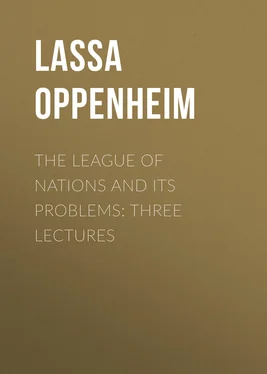Lassa Oppenheim - The League of Nations and Its Problems - Three Lectures
Здесь есть возможность читать онлайн «Lassa Oppenheim - The League of Nations and Its Problems - Three Lectures» — ознакомительный отрывок электронной книги совершенно бесплатно, а после прочтения отрывка купить полную версию. В некоторых случаях можно слушать аудио, скачать через торрент в формате fb2 и присутствует краткое содержание. Жанр: foreign_prose, foreign_antique, на английском языке. Описание произведения, (предисловие) а так же отзывы посетителей доступны на портале библиотеки ЛибКат.
- Название:The League of Nations and Its Problems: Three Lectures
- Автор:
- Жанр:
- Год:неизвестен
- ISBN:нет данных
- Рейтинг книги:4 / 5. Голосов: 1
-
Избранное:Добавить в избранное
- Отзывы:
-
Ваша оценка:
- 80
- 1
- 2
- 3
- 4
- 5
The League of Nations and Its Problems: Three Lectures: краткое содержание, описание и аннотация
Предлагаем к чтению аннотацию, описание, краткое содержание или предисловие (зависит от того, что написал сам автор книги «The League of Nations and Its Problems: Three Lectures»). Если вы не нашли необходимую информацию о книге — напишите в комментариях, мы постараемся отыскать её.
The League of Nations and Its Problems: Three Lectures — читать онлайн ознакомительный отрывок
Ниже представлен текст книги, разбитый по страницам. Система сохранения места последней прочитанной страницы, позволяет с удобством читать онлайн бесплатно книгу «The League of Nations and Its Problems: Three Lectures», без необходимости каждый раз заново искать на чём Вы остановились. Поставьте закладку, и сможете в любой момент перейти на страницу, на которой закончили чтение.
Интервал:
Закладка:
L. Oppenheim
The League of Nations and Its Problems: Three Lectures
PREFACE
The three lectures collected in this volume were prepared without any intention of publication. They were delivered for the purpose of drawing attention to the links which connect the proposal for a League of Nations with the past, to the difficulties which stand in the way of the realisation of the proposal, and to some schemes by which these difficulties might be overcome. When it was suggested that the lectures should be brought before the public at large by being issued in book form I hesitated, because I was doubtful whether the academic method natural to a University lecture would be suitable to a wider public. After consideration, however, I came to the conclusion that their publication might be useful, because the lectures attempt to show how the development initiated by the two Hague Peace Conferences could be continued by turning the movement for a League of Nations into the road of progress that these Conferences opened.
Professional International lawyers do not share the belief that the outbreak of the World War and its, in many ways, lawless and atrocious conduct have proved the futility of the work of the Hague Conferences. Throughout these anxious years we have upheld the opinion that the progress initiated at the Hague has by no means been swept away by the attitude of lawlessness deliberately—'because necessity knows no law'—taken up by Germany, provided only that she should be utterly defeated, and should be compelled to atone and make ample reparation for the many cruel wrongs which cry to Heaven. While I am writing these lines, there is happily no longer any doubt that this condition will be fulfilled. We therefore believe that, after the map of Europe has been redrawn by the coming Peace Congress, the third Conference ought to assemble at the Hague for the purpose of establishing the demanded League of Nations and supplying it with the rudiments of an organisation.
How this could be accomplished in a very simple way the following three lectures attempt to show. They likewise offer some very slight outlines of a scheme for setting up International Councils of Conciliation as well as an International Court of Justice comprising a number of Benches. I would ask the reader kindly to take these very lightly outlined schemes for what they are worth. Whatever may be their defects they indicate a way out of some of the great difficulties which beset the realisation of the universal demand for International Councils of Conciliation and an International Court of Justice.
It is well known that several of the allied Governments have appointed Committees to study the problem of a League of Nations and to prepare a scheme which could be put before the coming Peace Congress. But unless all, or at any rate all the more important, neutral States are represented, it will be impossible for an all-embracing League of Nations to be created by that Congress; although a scheme could well be adopted which would keep the door open for all civilised States. However, until all these States have actually been received within the charmed circle, the League will not be complete nor its aims fully realised. Whatever the coming Peace Congress may be able to achieve with regard to a scheme for the establishment of the League of Nations, another—the third—Hague Peace Conference will be needed to set it going.
L. OPPENHEIM.P.S.—While this Preface and volume were going through the Press, Austria-Hungary and Germany surrendered, and unprecedented revolutions broke out which swept the Hapsburg, the Hohenzollern, and all the other German dynasties away. No one can foresee what will be the ultimate fate and condition of those two once mighty empires. It is obvious that, had the first and second lectures been delivered after these stirring events took place, some of the views to be found therein expressed would have been modified or differently expressed. I may ask the reader kindly to keep this in mind while reading the following pages. However, the general bearing of the arguments, and the proposals for the organisation of the League of Nations and the establishment of an International Court of Justice and International Councils of Conciliation, are in no way influenced by these later events.
First Lecture
THE AIMS OF THE LEAGUE OF NATIONS
SYNOPSIS
I. The purpose of the three Lectures is to draw attention to the links which connect the proposed League of Nations with the past, to the difficulties involved in the proposal, and to the way in which they can be overcome.
II. The conception of a League of Nations is not new, but is as old as International Law, because any kind of International Law and some kind of a League of Nations are interdependent and correlative.
III. During antiquity no International Law in the modern sense of the term was possible, because the common interests which could force a number of independent States into a community of States were lacking.
IV. But during the second part of the Middle Ages matters began to change. During the fifteenth, sixteenth, and seventeenth centuries an International Law, and with it a kind of League of Nations, became a necessity and therefore grew by custom. At the same time arose the first schemes for a League of Nations guaranteeing permanent peace, namely those of Pierre Dubois (1305), Antoine Marini (1461), Sully (1603), and Emeric Crucée (1623). Hugo Grotius' immortal work on 'The Law of War and Peace' (1625).
V. The League of Nations thus evolved by custom could not undertake to prevent wars; the conditions prevailing up to the outbreak of the French Revolution made it impossible; it was only during the nineteenth century that the principle of nationality made growth.
VI. The outbreak of the present World War is epoch-making because it is at bottom a fight between the principle of democratic and constitutional government and the principle of militarism and autocratic government. The three new points in the present demand for a League of Nations.
VII. How and why the peremptory demand for a new League of Nations arose, and its connection with so-called Internationalism.
VIII. The League of Nations now aimed at is not really a League of Nations but of States. The ideal of the National State.
IX. The two reasons why the establishment of a new League of Nations is conditioned by the utter defeat of the Central Powers.
X. Why—in a sense—the new League of Nations may be said to have already started its career.
XI. The impossibility of the demand that the new League of Nations should create a Federal World State.
XII. The demand for an International Army and Navy.
XIII. The new League of Nations cannot give itself a constitution of a state-like character, but only one sui generis on very simple lines.
XIV. The three aims of the new League of Nations, and the four problems to be faced and solved in order to make possible the realisation of these aims.
THE LECTURE
I. Dr. Whewell, the founder of the Chair of International Law which I have the honour to occupy in this University, laid the injunction upon every holder of the Chair that he should 'make it his aim,' in all parts of his treatment of the subject, 'to lay down such rules and suggest such measures as may tend to diminish the evils of war and finally to extinguish war between nations.' It is to comply with the spirit, if not with the letter, of this injunction that I have announced the series of three lectures on a League of Nations. The present is the first, and in it I propose to treat of the Aims of the League. But, before I enter into a discussion of these aims, I should like to point out that I have no intention of dealing with the question whether or no a League of Nations should be founded at all. To my mind, and probably to the minds of most of you here, this question has been satisfactorily answered by the leading politicians of all parties and all countries since ex-President Taft put it soon after the outbreak of the World War; it suffices to mention Earl Grey in Great Britain and President Wilson in America. In giving these lectures I propose to draw your attention, on the one hand, to the links which connect the proposal for a League of Nations with the past, and, on the other hand, to the difficulties with which the realisation of the proposal must necessarily be attended; and also to the ways in which, in my opinion, these difficulties can be overcome.
Читать дальшеИнтервал:
Закладка:
Похожие книги на «The League of Nations and Its Problems: Three Lectures»
Представляем Вашему вниманию похожие книги на «The League of Nations and Its Problems: Three Lectures» списком для выбора. Мы отобрали схожую по названию и смыслу литературу в надежде предоставить читателям больше вариантов отыскать новые, интересные, ещё непрочитанные произведения.
Обсуждение, отзывы о книге «The League of Nations and Its Problems: Three Lectures» и просто собственные мнения читателей. Оставьте ваши комментарии, напишите, что Вы думаете о произведении, его смысле или главных героях. Укажите что конкретно понравилось, а что нет, и почему Вы так считаете.












